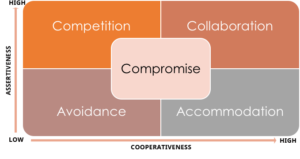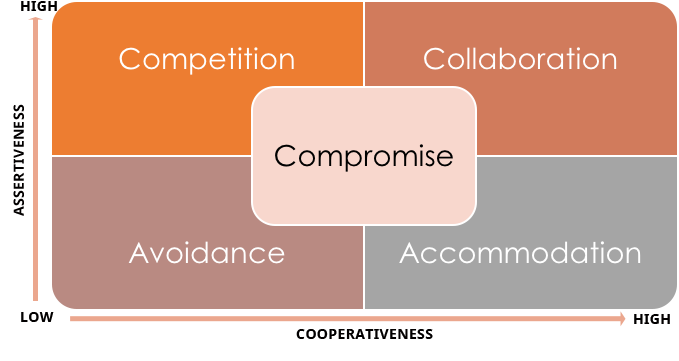Managing Workplace Conflicts
Leaders and managers know that conflicts in the workplace cannot be avoided; people come from different backgrounds, hold diverse beliefs and distinct value systems. These differences in personalities and opinions are bound to pitch people against each other from time to time.
The Thomas Kilmann Conflict Mode Instrument (TKI) was developed for leaders and managers to help them manage conflicts that arise within their organizations. Its use is not restricted to top leadership or management alone; team leaders can use it to resolve conflicts that arise within their teams, supervisors and line managers can use it as a conflict management tool to resolve conflicts that arise between subordinates.
TKI showcases the 5 conflict styles and provides corresponding approaches that can be used to handle these conflict styles. Leaders can use the TKI to identify the kind of conflict resolution style they resort to when managing conflict resolution and it is useful for leaders who wish to explore other possible approaches to conflict management. Since one style of conflict resolution will not necessarily work all the time, it is important that leaders and managers expand their conflict management portfolio to accommodate all possible conflict resolution approaches. This way, they will be better prepared to apply the right approach in diverse conflict situations.
TKI assesses response to conflicts along two dimensions; Assertiveness and Co-cooperativeness
 Assertiveness is being able to stand up for what one believes in without being overly aggressive. Individuals that are assertive express their thoughts, opinions, ideas in a calm but firm way.
Assertiveness is being able to stand up for what one believes in without being overly aggressive. Individuals that are assertive express their thoughts, opinions, ideas in a calm but firm way.
Cooperativeness is a personality trait that refers to the extent to which an individual shows agreeability when interacting with others. It denotes compliance and the rate at which an individual shows cooperation in certain situations.
Under these two dimensions, five conflict reactions can be identified:
- Competition
- Collaboration
- Compromise
- Avoidance
- Accommodation
Competition
This is the conflict response that arises where the person involved is highly assertive with extremely low tendency for cooperation. This individual always wants to have the last word and win every argument, regardless of whose ox is gored. He will trample on people’s emotions, use his power and position to get what he wants, whether it is the best course of action or not. This individual is egoistic and uses coercion and force to win arguments.
Collaboration
This is the conflict response elicited from people that are highly assertive and highly cooperative. He is open to dialogue and will not shy away like the Avoider. Unlike the competitor that uses force to have the last word, the collaborator is more interested in going with the best course of action. He does not force his opinions on others and will prefer round table dialogue as a means of conflict resolution. He is more interested in getting creative solutions to the issues at hand.
Compromise
This is the conflict response of an individual that is middle ground in terms of assertiveness and cooperativeness. His main objective in conflict resolution is to find a middle ground where all differing ideas and opinions can meet and agree. As its name implies, compromise is more tolerant than competition in terms of power exertion but firmer in stance than avoidance. While it seeks to directly address and resolve conflict, it will not shy away like avoidance.
Avoidance
The avoider is at the extreme rung of the ladder. They show low level of assertiveness and low level of cooperativeness. The person with this type of conflict response will rather shirk away from conflicts and issues and when they arise, he will try to stay low and not try to deal with the issue at hand. While this is not an advised response to conflict resolution and management, it can be very useful in some situations (e.g., when the issue at hand needs to be addressed at a future date for diplomacy purposes or when the environment is unfriendly and too chaotic for reasonable resolution).
Accommodation
This conflict response type is displayed by individuals who are unassertive but highly cooperative. In resolving conflict situations, the individual puts the needs and concerns of the other party before his own. This individual is usually selfless, highly compromising (might be compromising to a fault) and self-sacrificing in nature.
Application of the Thomas Kilmann Conflict Mode Instrument can help leaders and managers save money and valuable time that would otherwise have been lost to a long and lengthy conflict resolution process. it helps to promote healthier working environments and can help boost overall productivity and workplace relationships. Contact us today about how we can help.

No Comments